Photographs: B Mathur/Reuters
Talks with Pakistan are a futile exercise, former national security adviser Brajesh Mishra tells rediff.com's Sheela Bhatt, and urges the government to call the dialogue off.
Underlining the need to talk to Pakistan, former prime minister Atal Bihari Vajpayee had said we can't choose our neighbours. Why are you against the talks?
I don't remember the exact context of Vajpayee's speech but every prime minister of India wanted good relations with Pakistan. There is nothing new in these attempts. What we [the Bharatiya Janata Party-led National Democratic Alliance government] did was different after learning the lessons from the Agra talks. We didn't talk to Pakistan until it took some steps against terror.
In this context, what is more important is Vajpayee's statement in April 2003 in Srinagar. He said, 'Once again I extend my hand of friendship to Pakistan.' That was the third and last time he did it and [former Pakistan] president [Pervez] Musharraf responded to that. Nothing happened until November 25, 2003. Then, the ceasefire on the Line of Control took place. Only after that, the back-channel discussion started with Pakistan.
Then we got the January 2004 declaration in Islamabad. That statement was very clear that the resumption of dialogue was dependent on cessation of terrorism. Unfortunately, the United Progressive Alliance government changed the meaning of the 2004 agreement when it came to power -- the UPA says terrorism will not be allowed to impede the peace process. We said in January 2004 that terrorism and dialogue cannot go together. You have these statements of Musharraf and Prime Minister Manmohan Singh after the meetings in New York and Havana. It was said that Pakistan was also the victim of terrorism and the 'joint [anti-terror] mechanism' was launched.
All that came to zilch. Terrorism continued. In 2006, serial blasts occurred in Mumbai and at the same time talks were going on with Musharraf with the help of back channel [diplomacy].
My point is that you have done it before. Despite terrorism, you held talks with Pakistan and did not succeed. Why are you doing same thing now? Why don't you go back to the January 2004 statement? Terrorism and dialogue cannot go together. Tell Pakistan that you stop this and then we will resume the composite dialogue. Look, we have to talk -- this is what this government is saying.
Much before what [United States Senator] John Kerry said on his tour to India this week, it was obvious to all of us that India was working under American and British pressure. They more or less forced India to talk to Pakistan. But, the United States and the North Atlantic Treaty Organisation are withdrawing from Afghanistan -- as I see it, despite what Kerry is saying. Then, why do they need us to talk? Because Pakistan is very happy to help Taliban in Afghanistan so that the Americans and others can walk out. Some three months back General [Ahmed Shuja] Pasha, chief of Pakistan's Inter Services Intelligence, said he can arrange a meeting with [Taliban chief] Mullah Omar. I don't understand why we need to talk to Pakistan then.
'Peace after talks with Pakistan is wishful thinking'
Image: Pakistani activists of the Islamic hardliner party Jamaat-ud-Dawa shout anti-India slogans during a rally in IslamabadPhotographs: Faisal Mahmood/Reuters
Indians are worried about terrorism. The government is looking for solutions. If we don't talk to Pakistan, how do you go about it?
What is our past experience of talks to Pakistan? Indira Gandhi gave up 96,000 prisoners of war. [Zulfiqar Ali] Bhutto promised that he will accept the Line of Control as the border. He went back on his promise. He left India and immediately went on to give permission for building nuclear weapons. It's not that India has not talked before, but we have been always betrayed by Pakistan. Being a neighbour you have to talk to them. But talk when you are stronger, not when we are weak.
Why do you say we are weak?
Of course we are weak! The US has given $10 billion and also, Pakistan is being given F-16 and other modern fighter planes. Pakistan, today, is becoming almost the same in conventional strength compared to India. While we have not been adding to our capacity, they are acquiring weapons at speed.
Even if Pakistan has betrayed India, as you say, the solution-oriented approach demands that we look for the way out to get them to do what we want.
But to do that you should be objective in assessing the situation. Just by having a wish for solution does not lead you to the correct assessment of the real situation. Let us be very clear -- the Pakistan army does not want good relations with India.
First it was Kashmir but suddenly since the last few months, they are raising the issue of water. Now, they are telling the US and others that let India get out of Afghanistan. I don't know which other issues they would raise tomorrow.
Of course, it's not democracy that prevails in Pakistan. The Pakistan army considers itself as the guardian of Pakistan. Its very existence depends on enmity with India. My contention is that this is the objective situation. In this situation, what are you going to achieve unless you get them first to stop terrorist activity? When the announcement of talks with Pakistan was made early this month, it was said that we will talk about terrorism and other related issues -- more or less composite dialogue.
One day before this announcement, the United Jihad Council met in Pakistan-occupied Kashmir. The UJC cannot meet without the permission of the Pakistan army and the ISI. And, I don't imagine that the Pakistan army was not aware about what was happening on the diplomatic front between the two countries. Despite that, they allowed the UJC to meet and then next day they came out with the agenda for talks. And, still, we say that we want to talk about terrorism and other related issues. I want to understand what India is going to get from these talks.
Maybe peace?
That's wishful thinking. It's not an objective assessment.
'If India is strong then it need not bother about Pakistan'
Image: Followers of Osho ashram greet each other at the site of a bomb blast at the German Bakery restaurant in PunePhotographs: Punit Paranjpe/Reuters
India is facing terrorism.
So? It is the official agency in Pakistan that is supporting terrorism within India. There is terrorism in China. Is the Chinese government supporting it? No! In the US or the United Kingdom, terrorism is there but nowhere the official agency supports it -- except in Pakistan. What I am trying to say is that I am not opposed to friendly and cooperative relations with Pakistan. But there are two conditions: One, India must be strong. Two, unless Pakistan stops supporting terrorism, there cannot be any talks.
But India is maintaining 8 to 9 per cent growth. India is united. It has a functioning democracy. India is strong enough to initiate dialogue.
If India is strong then it need not bother about Pakistan. The fact is India is not strong. The 9 percent growth is not going to ensure your national security. The first duty of the State is to protect the lives and properties of its citizens. What will this 9 percent growth do? Unless, you have 9 percent growth plus military strength, you are not going to be counted in the world.
Pakistan and China are hostile. Nepalese are dictated by Maoists. Despite Sheikh Hasina being in power, Bangladesh is getting closer to China. Despite what all you did for Sri Lanka, the Chinese presence in Sri Lanka is there for all to see. They are building a new port for them. India is a soft State. Nobody is bothered about us. Neighbuoring countries are taking advantage of you.
You helped defeat the Liberation Tigers of Tamil Eelam, but when your ship went there to help with goods, it was not allowed to anchor for long. Nobody is bothered about India. They don't consider 9 per cent growth important enough. Deng Xiaoping was talking about four modernisations. One of it was the modernisation of the People's Liberation Army. He knew just economic reforms won't make China stronger. We [India] have neglected the armed forces since Independence.
'The agenda for talks are a sure remedy for failure'
Image: The Indian Army's MBT Arjun tanks participate in the rehearsal for the Republic Day parade in New DelhiPhotographs: B Mathur/Reuters
India is a poor country.
We are not poor.
How can you spend more on defence when people don't have enough food, education and health facilities?
Then what will you do? Our space can be occupied by somebody. Is it okay? Let us remain the target. What are the Pune and Taj [Mumbai] attacks? What balance can you talk of when the State fails to fulfill its first duty -- to protect its citizens' lives and property?
In the post-Cold War era, bilateral relations are handled differently. In the modern world people want to move forward for development. If you are given the talks to move forward with Pakistan so that India can move forward on many other fronts, how will you go about it?
I told you. Let us talk about the January 2004 agreement. Ask Pakistan: What have you done? And, you are frequently talking about the 'modern world'. Let me say a few things. After the demise of the Soviet Union, was it necessary for NATO to expand eastwards? This is the modern world you are talking about. If the Warsaw pact had been resolved, where was the threat for these countries from Russia? This is also the modern world. China has settled its border issue with Russia but they still have maritime issues with Japan, Malaysia, Vietnam and the Philippines.
Isn't it advantage India if bilateral relations with Pakistan improve?
Only if it improves on the basis of your conditions. Mrs [Indira] Gandhi did move forward; what did we get?
There is an argument that what is happening in Pakistan, and even terrorism in India emanating from Pakistan, is not under the control of the Pakistani government.
What is happening in India is under the control of Pakistan. Jaish [e-Mohammad], HuJI [Harkat-ul Jihad al Islami] and LeT [Lashkar-e-Tayiba] are certainly [under Islamabad's control]. I am not talking about the Taliban. I am talking of the United Jihad Council in PoK. That's of course under the control of Pakistan.
It was so even in 2004 when you were in Islamabad.
We got what was agreed by Musharraf. The statement said that Pakistan will not allow Pakistani territory to be used by terrorists. Only then we agreed to start composite dialogue. I am saying talk to Pakistan only on terrorism. Pakistan is saying clearly that they are going to Delhi to start composite dialogue. Across the table you will say terror and they will say Kashmir. What will you do? Failure?
I read in the newspapers that the government is not united about holding talks. The government's statement is now revised. Instead of talking about 'terrorism and other related issues,' the government now says it will talk only about terrorism. If it's true, then exactly this will happen. India will be sitting here and Pakistani representatives over there. And both will be talking at cross purposes. It's a sure remedy for failure.
'1 billion people were humiliated in Mumbai on 26/11 by them'
Image: Pakistan army soldiers take part in an annual military exercise at the Punjab provincePhotographs: People take part in a candlelight vigil held for victims of Mumbai's terror attacks
Then, some people would say, talk Kashmir.
I have told you that Kashmir is not the only issue between us. Second, how do you solve the Kashmir issue? Pakistan is not going to accept the LoC as the border.
During your time in the Prime Minister's Office, you were talking through back channel too.
We were not talking on Kashmir. I did not. My entire back channel thing, which lasted less than one year, resulted in the ceasefire on the LoC. Two, it resulted in the January 6, 2004 statement. We didn't talk about Kashmir, we talked about terrorism.
Do you see the issue shaping up in our lifetime?
Only if India is militarily strong, the Kashmir issue may take final shape. Then, Pakistan will accept the situation on the ground.
During your time, India was on a stronger wicket. What happened then?
How? I am talking of military strength. We lost 500 jawans in Kargil. It was the hard task. Now, Pakistan is much more militarily stronger than ever.
Sorry to use a cliche, but you sound hawkish.
Listen, I started off by saying that every prime minister of India started with having good relations with Pakistan. But, objective conditions today and the Pakistan army's policy do not allow success. So, don't waste your time on this. I am very sorry to say that 1 billion people were humiliated in Mumbai on 26/11 by them. Now, we are humiliating ourselves without them having done anything on 26/11.
They keep on postponing the trial. They have released Hafiz Saeed. What are we talking about? They allowed the UJC to have the meeting in PoK. Isn't it the humiliation of 1 billion people? I say call off the talks.
'We should look at our agenda, not that of the US'
Image: An Afghan soldier attempts to break open a door as US Marines look on during an operation in the town of Marjah in Helmand provincePhotographs: Goran Tomasevic/Reuters
A frequent argument is that let Pakistan's eastern border see less tension to concentrate on the western border.
The Americans and the British have forced India to do this. But, it is their agenda. We should look after our own agenda. We can't follow their agenda.
One thinking is that if the US and NATO's defense position against Taliban gets strengthened, it's in India's advantage as well.
That is a very big if. Second, my reading is the US and the UK just want an honorable way out and [want to] hand over Afghanistan to the Taliban.
On his India visit Kerry said
I don't read John Kerry.
He told a daily, 'Under no circumstances are we planning to have no presence or suddenly depart.'
He has said so many things in the past.
So, you believe that the US will leave from Afghanistan as Obama has promised.
The US and the UK are going to run away from Afghanistan.
If that happens, that is the reason to talk to Pakistan. Because after the US and NATO's exit from Afghanistan, the entire region will become more insecure.
But what will you talk to Pakistan? Hand over Kashmir for [better security]? Do you mean that? That is what Pakistan wants. Pakistan wants Kashmir, wants to settle water issues on their terms. And Pakistan wants India to remain out of Afghanistan. Do you think by talking to they will permit you to be in Afghanistan?
My submission is that the issue of Afghanistan is complex and it's inter-related with the region's security. So, the withdrawals of the US will have bearing on India's security.
It is not complex if one is very clear about the aims of the Pakistan army. You people do not think of what the objective situation in Pakistan is. The situation is that Pakistan army has full control over three issues: India, Afghanistan and the nuclear issue. The civilian government has no say in these matters. The Pakistan army can not exist without having
control over it. You keep on saying talk to Pakistan; talk to them about what?
'Then give up Kashmir'
Image: A Kashmiri protester throws a stone towards the police during a protest in SrinagarPhotographs: Fayaz Kabli/Reuters
Do you think it's prudent to talk to the Pakistan army if and when possible?
If and only if you are strong. As I said, if you are militarily strong Pakistan will accept the situation as it is.
You paint a grim scenario.
It is a grim scenario. I haven't made it up.
But military build-up will require another 10 years.
Now we are getting into the other part of the subject. The procedures of our defence department are 19th century procedures. We have to reform it. We have to take the strategic decision about modern weapons. The Bofors thing is still hanging on our politicians' shoulders. They are worried that we will be accused of corruption. You will be accused of corruption in any case! But, you [politicians] are neglecting national security. They have declared that we want 123 multi-combat aircraft. But the way they are proceeding, it will take them 15 years to acquire it. By that time, the aircraft will be obsolete. Let us forget about these 19th century procedures and come up with a modern system. The government needs to have national security culture. It doesn't have. It likes only 9 percent growth!
Here, some people may say, 'Mr Mishra is saying the same thing that India is arguing since the last 60 years.' You are saying the Pakistan army has control. Pakistan doesn't want peace. But if India wants to move forward, it will need peace with Pakistan.
The same people about whom you are talking, why do they forget that every Indian government since the last 60 years has tried to have peace with Pakistan and failed? Why have they failed?
They allege that talks have failed because India is just not flexible to settle the issue.
Okay. On Kashmir? Then give up Kashmir!
How about give and take instead?
What give and take? Please you tell me what you can 'give'? These very people who are saying do business with Pakistan, will they accept the change in the Line of Control?
I don't think they will.
Then? What are we talking about?
What is the solution?
I told you. Be strong first.
That's the long way to go.
Revise your acquisition procedures. Take strategic decisions -- which weapons you want, and get it.
'Ask people who bore the brunt of terrorism if they want talks'
Image: Ajay Verma/ReutersPhotographs: People take part in a candlelight vigil held for victims of the Mumbai terror attack
Looking at it practically, India is not losing anything. Rather, India will earn credibility that it is seeking peace with Pakistan.
Are we not losing anything? Pakistan has done nothing about 26/11. Just a few weeks ago you were only saying that we will not talk with Pakistan unless they take action against 26/11 plotters. What are we talking about now? [Home Minister] P Chidambaram was saying just three weeks ago that we won't talk unless action is taken. [Finance Minister] Pranab Mukherjee said it when he was minister of external affairs. Now, what has happened?
Let me ask you again. Is India not worried about US-NATO forces moving out? Yes or no?
Of course we should be worried. But India has no control over it. These two gentlemen, President Barack Obama and [British] Prime Minister Gordon Brown, the two main contributors to the defence forces in Afghanistan, have decided to withdraw and run. They are looking for some honourable excuse.
Last week, a New Delhi-based expert told rediff.com that 'by agreeing to talk to Pakistan under US pressure India is contributing in the fight against Taliban.'
Whoever has said that, ask him if his family member was attacked in 26/11. Ask him that, please. It's very good to say such things sitting far away from the reality. They advise India should do this and do that, but ask those people who bore the brunt of terrorist attacks.
Barbara Crossette says India is the biggest pain in Asia and she says India often gives global governance the biggest headache.
This shows the failure of the diplomatic efforts of this government. When the victim is asked to make concessions, isn't it a failure? The victim is being told to take into account the concerns of the perpetrators of the Mumbai attack. Come on, please! These people don't understand that the government's diplomatic effort has failed miserably. It didn't take strong action in the beginning [after the Mumbai attacks]. It has lost everything.

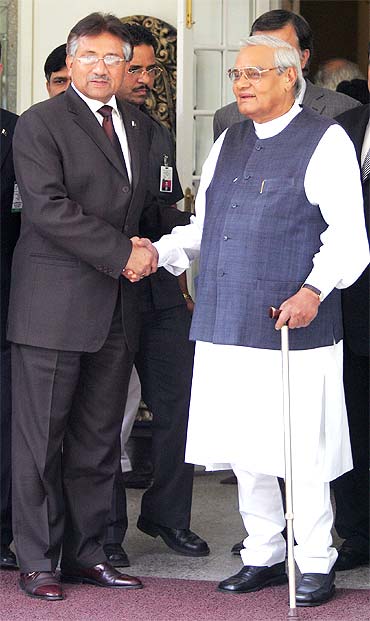
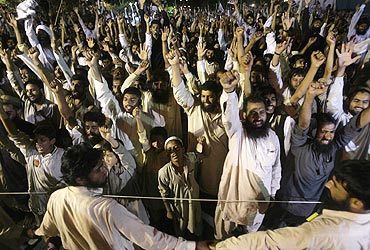
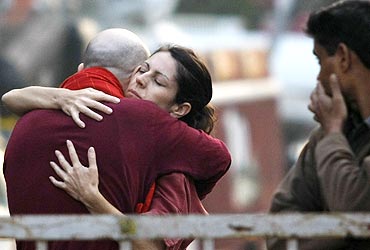
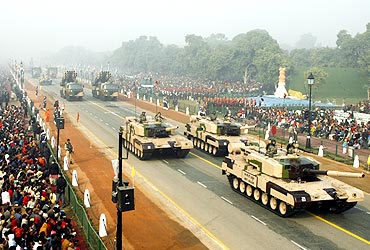
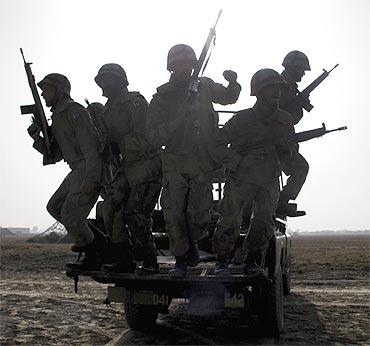
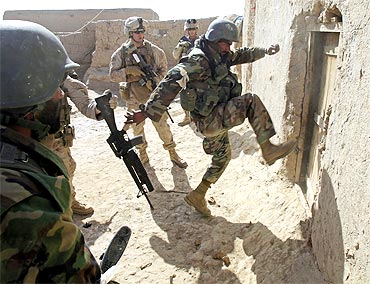
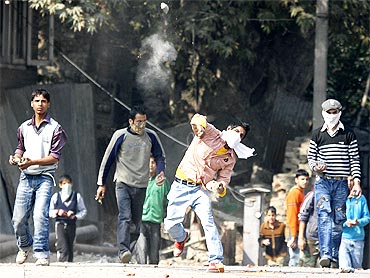
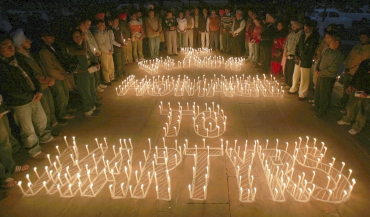
article